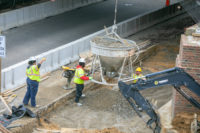In an attempt to move a longsnarled aviation bill, the Senate again is preparing for a floor debate on a two-year, $34.6-billion authorization measure that includes $8 billion for airport construction grants. Senate commerce committee Chairman Jay Rockefeller (D-W.Va.), who introduced the measure on Jan. 27, said the new bill is the same as a proposal the Senate approved last March by a 93-0 vote.
Rockefeller’s bill does not provide an increase in the current $4.50 passenger facility charge (PFC), except for a new pilot program that would remove the PFC cap completely at up to six airports. PFCs fund airport infrastructure projects; construction and airport groups would like the fee hiked nationwide.
Since Sept. 30, 2007, when the last multiyear aviation law expired, Federal Aviation Administration programs have been operating under a series of stopgap authorizations. The current extension, the 17th in that series, expires on March 31.
Passage of a multiyear FAA bill stalled last year in part because of disagreements over issues such as adding slots for long-distance flights to and from Ronald Reagan Washington National Airport.
Rockefeller’s new bill is silent on slots, but Majority Leader Harry Reid (D-Nev.) says senators will be able to offer amendments on slots, PFCs and other issues.
Sen. Charles Schumer (D-N.Y.) noted that legislative “turbulence” blocked the bill last year. However, he now says, “We predict smooth skies ahead. We expect the bill to pass … with strong bipartisan support. We can’t afford another short-term fix.”
In the House, new Transportation and Infrastructure Committee Chairman John Mica (R-Fla.) said on Jan. 26 that clearing an FAA bill is the first order of business this year for his panel.
American Association of Airport Executives President Charles Barclay says, “We badly need an FAA reauthorization bill that is multi-year for the safety, capacity and economic impact on this system.”
Barclay estimates that the bill’s $8.1 billion for FAA Airport Improvement Program construction grants would create or support 280,000 jobs, including 90,000 in construction and supplier firms.


